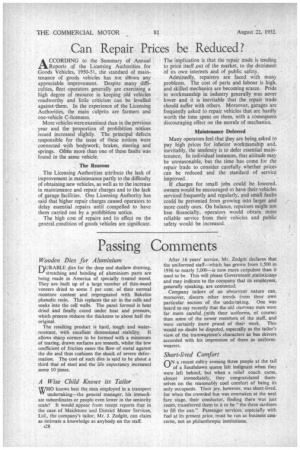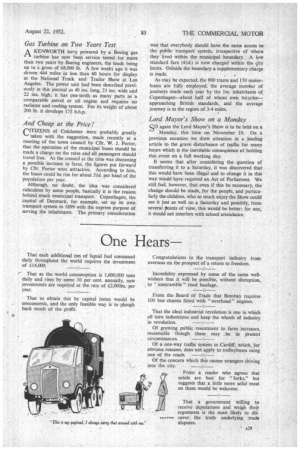Passing Comments
Page 30

Page 31

If you've noticed an error in this article please click here to report it so we can fix it.
Wooden Dies for Aluminium
DURABLE dies for the deep and shallow drawing, stretching and bending of aluminium parts are being made in America of specially treated wood. They are built up of a large number of thin-wood veneers dried to some 5 per cent. of their normal moisture content and impregnated with Bakelite phenolic resin. This replaces the air in the cells and soaks into the cell walls. The panel formed is heat dried and finally cured under heat and pressure, which process reduces the thickness to about half the original.
The resulting product is hard, tough and water resistant, with excellent dimensional stability. It allows sharp cOrners to be formed with a minimum of tearing, drawn surfaces are smooth, whilst the low coefficient of friction eases the flow of metal against the die and thus cushions the shock of severe deformation. The cost of such dies is said to be about a third that of steel and the life expectancy increased some 10 times.
A Wise Child Knows its Tailor
wHo knows best the men employed in a transport " undertaking—the general manager, his immediate subordinates or people even lower in the seniority scale? It would appear from recent reports that in the case of Maidstone and District Motor Services, Ltd., the company's tailor, Mr. J. Zedgitt, can claim as intimate a knowledge as anybody on the staff.
A28 After 16 years' service, Mr. Zedgitt declares that the uniformed staff—which has grown from 1,500 in 1936 to nearly 3,000—is now more corpulent than it used to be. This will please Government statisticiaqs and may indicate to the company that its employees, generally speaking, are contented.
Company tailors of an observant nature can, moreover, ,discern other trends from their own particular section of the undel taking. One was heard to say recently that the old tramway men were far more carefuLfwith their uniforms, of course) than some of the newer members of the staff, and were certainty more proud of their work. This would no doubt be disputed, especially as the tailor's view of the tramwaymen's characters as bus drivers accorded with his impression of them as uniformwearers.
Short-lived Comfort
ON a recent sultry evening three people at the tail of a Southdown queue felt indignant when they were left behind, but when a relief coach came, almost immediately, they congratulated themselves on the reasonably cool comfort of being its only occupants. Their joy, however, was short-lived, for when the crowded bus was overtaken at the next fare stage, their conductor, finding there was just room, transferred them to it to be " the three sardines to fill the can." Passenger services, especially with fuel at its present price, must be run as business concerns, not as philanthropic institutions.
Gas Turbine on Two Years Test
A ICENWORTH lorry powered by a Boeing gas 1-1 turbine has now been service tested for more than two years by Boeing engineers, the loads being up to a gross of 68,000 lb. A few weeks ago it was driven 444 miles in less than 60 hours for display at the National Truck and Trailer Show at Los Angeles. The power unit had been described previously in this journal as 40 ins. long, 23 ins, wide and 22 ins, high; it has one-tenth as many parts as a comparable petrol or oil engine and requires no radiator and cooling system. For its weight of about 200 lb. it develops 175 b.h.p.
And Cheap at the Price!
CITIZENS of Colchester were probably greatly taken with the suggestion, made recently at a meeting of the town council by Cllr. W. J. Porter, that the operation of the municipal buses should be made a charge on the rates and all passengers should travel free. As the council at the time was discussing a possible increase in fares, the figures put forward by Cllr. Porter were attractive. According to him, the buses could be run for about 51d. per head of the population per year.
Although, no doubt, the idea was considered ridiculous by some people, basically it is the reason behind much municipal transport. Copenhagen, the capital of Denmark, for example, set up its own transport system in 1899 with the express purpose of serving the inhabitants. The primary consideration was that everybody should have the same access to the public transport system, irrespective of where they lived within the municipal boundary. A low standard fare (41d.) is now charged within the city limits. Outside the boundary a supplementary charge is made.
As may be expected, the 900 trams and 150 motorbuses are fully employed, the average number of journeys made each year by the 1 m. inhabitants of Copenhagen—about half of whom own bicycles— approaching British standards, and the average journey is in the region of 3-4 miles.
Lord Mayor's Show on a Monday
SO again the Lord Mayor's Show is to be held on a Monday, this time on November 10. On a previous occasion we drew attention in a leading article to the grave disturbance of traffic for many hours which is the inevitable consequence of holding this event on a full working day.
It seems that after considering the question of transferring it to a Saturday, it was discovered that this would have been illegal and to change it in this way would have required an Act of Parliament. We still feel, however, that even if this be necessary, the change should be made, for the people, and particularly the children, who so much enjoy the Show could see it just as well on a Saturday and possibly, from several points of view, this would be better; for one, it would not interfere with school attendance.




















































































